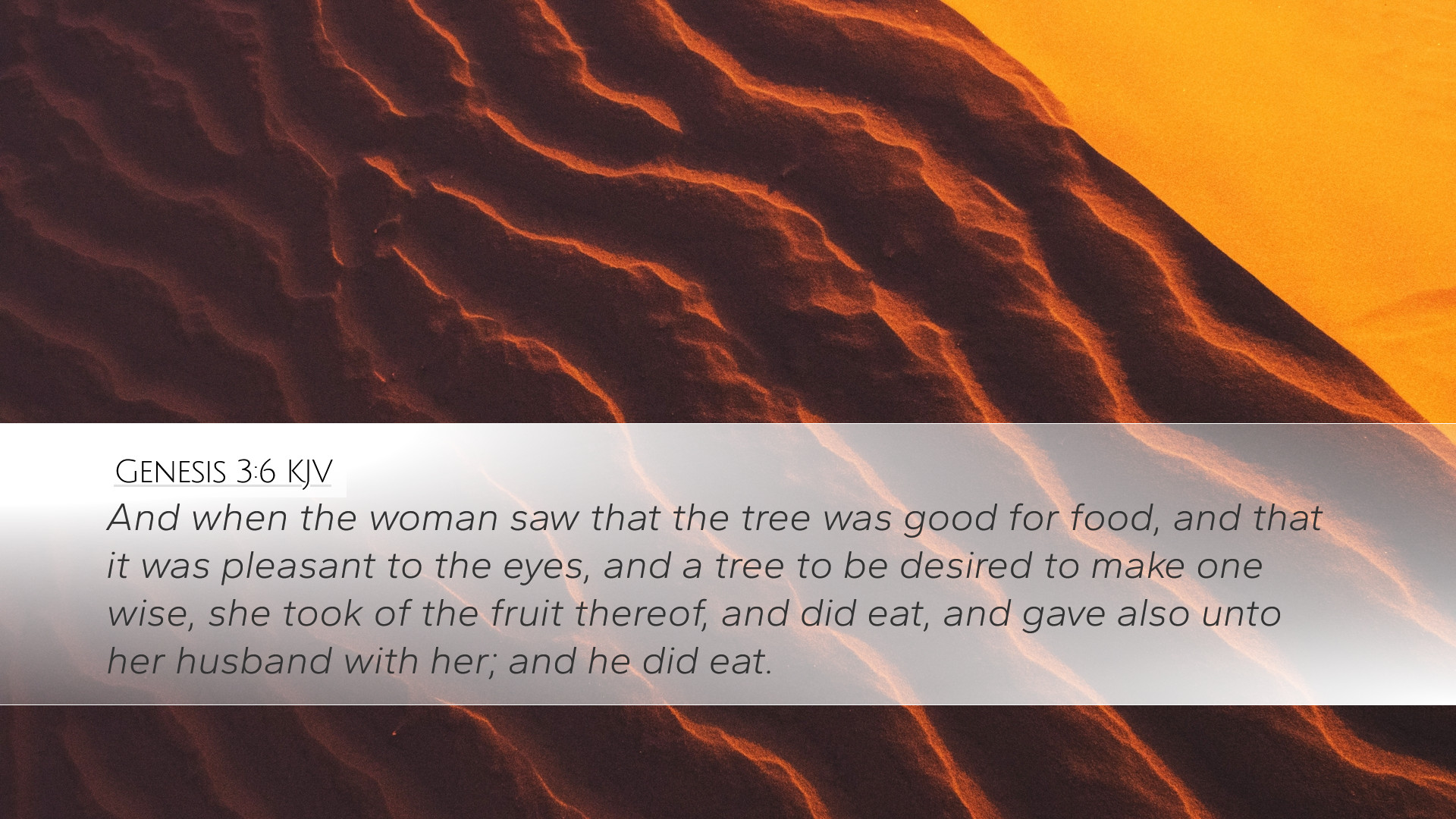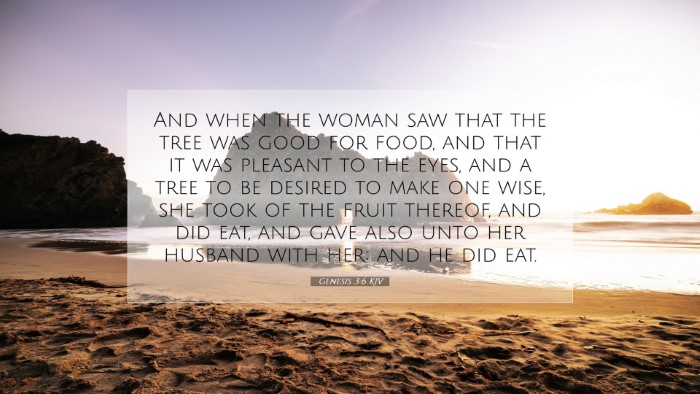Commentary on Genesis 3:6
Verse: "And when the woman saw that the tree was good for food, and that it was pleasant to the eyes, and a tree to be desired to make one wise, she took of the fruit thereof, and did eat, and gave also unto her husband with her; and he did eat."
Introduction
This verse marks a significant turning point in the Genesis narrative, highlighting the moment of humanity's disobedience to God. It encapsulates the temptation, fall, and the profound consequences of sin. The use of insights from public domain commentaries by notable theologians such as Matthew Henry, Albert Barnes, and Adam Clarke offers a comprehensive understanding of its implications.
The Woman's Observation
Key Insights:
- Matthew Henry: Reflects on the stages of temptation, noting how Eve’s focus on the tree shifted from divine command to its appeal. The observation was a moment of yielding to desire, where she began to rationalize.
- Albert Barnes: Emphasizes the external attributes of the tree: "good for food," "pleasant to the eyes," and "to be desired." He argues that these sensory appeals played a crucial role in her decision-making process.
- Adam Clarke: Points out that the first error was in using her senses to determine good rather than the word of God. This highlights a shift in authority from divine instruction to human perception.
Temptation and Rationalization
The allure of the fruit is multifaceted. Eve perceives it as good, appealing, and a means to wisdom.
Henry notes that this reflects a dangerous tendency to judge God’s commandments according to human standards.
Barnes elaborates that her reasoning exposes a deeper spiritual blindness where the immediate allure overshadowed eternal truth.
Clarke adds that such rationalization is the seedbed for sin, illustrating how humans often twist God’s truths to suit their desires.
The Act of Disobedience
The verse details Eve's act of taking and eating the fruit, culminating in the fall.
Matthew Henry expounds that Eve's action symbolizes a breach of faith, where she placed her trust in her understanding over God's command.
Albert Barnes underscores that this choice brought sin into the world, making the gravity of her disobedience evident.
Adam Clarke views this act as a monumental shift from obedience to rebellion, illustrating the ease with which sin can enter the human heart.
Influence on Adam
Eve's subsequent offering to Adam indicates the contagion of sin.
Henry suggests that Eve's sin was compounded by her influence over Adam, demonstrating how sin can spread.
Barnes points out that Adam's consent changes the nature of their disobedience, emphasizing collective responsibility.
Clarke asserts that Adam’s choice to eat signifies a critical failure to uphold the divine command, further solidifying the tragedy of the human condition.
Theological Implications
The implications of Genesis 3:6 extend beyond the immediate narrative, serving as a foundation for various theological discussions:
- Original Sin: This passage is foundational in understanding the doctrine of original sin, as articulated by theologians throughout history, highlighting the inherent tendency of humanity to sin.
- The Nature of Temptation: The commentary reflects on the nature of temptation, illustrating that the path to sin often begins with a shift in focus away from God.
- Human Responsibility: The actions of Eve and Adam underline the personal responsibility before God, encouraging reflection on modern day choices.
- Divine Judgment and Redemption: The forthcoming consequences of their actions set the stage for discussions on divine judgment but also foreshadow the eventual redemptive plan through Christ.
Conclusion
Genesis 3:6 serves as a profound reminder of humanity’s vulnerability to temptation and the consequences of disobedience.
Through the insightful commentary of Matthew Henry, Albert Barnes, and Adam Clarke, readers are called to reflect on their own lives, recognizing the allure of sin and the importance of aligning one’s understanding and actions with God's will.
This verse crystallizes the human condition and the ongoing need for divine grace and redemption.


